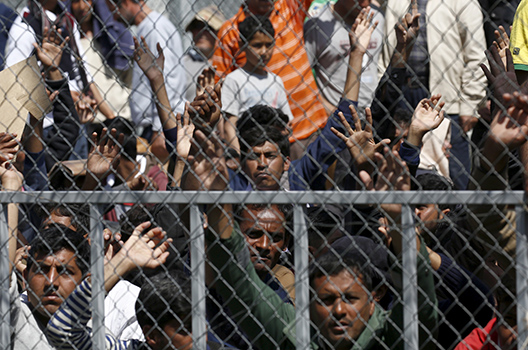This article was originally published in the Summer 2018 edition of The Cairo Review of Global Affairs. An excerpt is published here with permission.
The Syrian civil war, which began seven years ago, has had an ongoing deep and tragic impact on Syrians. Half a million lost their lives and 11.5 million were displaced. Of those displaced, more than six million became internal refugees and over 5.6 million fled to neighboring countries. Sharing a 911-km border with Syria, Turkey became the country most affected by the migratory movement of Syrian refugees. For the first four years of the war, Turkey handled the crisis on its own without much international support and assistance. Today, it is much harder to do that. Turkey has become the world’s largest refugee-hosting nation and a permanent home to more than 3.5 million Syrian refugees living there, in comparison to 986,000 in Lebanon and 66,000 refugees in Jordan.
In 2015, the Syrian refugee crisis reached a grim milestone. The suffering of Syrian refugees taking the world’s deadliest migration route through the Mediterranean Sea drew global attention to their plight. The harrowing image of the corpse of Aylan Kurdi washing up on Turkey’s Aegean shores became the symbol of the suffering and despair of Syrian refugees. But more importantly, 2015 marked the beginning of the refugee crisis in Europe. More than a million Syrian refugees reached European shores primarily via the Turkey–Greece sea route and dispersed all over the continent. This development brought Turkey and the European Union (EU) closer on cooperating to stem the influx of refugees from the south.
It was against this backdrop that on November 29, 2015, the EU and Turkey negotiated a deal to stop the migration flow into Europe. Through the “refugee deal,” Turkey sought to share the burden of hosting millions of refugees but also leveraged the deal to extract concessions from the EU, as well as revive its waning relations with Europe. According to the EU–Turkey statement of March 18, 2016, both parties welcomed the ongoing work to upgrade of the Customs Union, which governs trade with Turkey, and per Ankara’s request, the EU agreed to accelerate fulfilment of the visa liberalization roadmap, that is visa-free travel for Turkish citizens in the Schengen area, an area of the EU without passport controls between citizens of different EU member countries. The statement also sought a resolution to the issue of its accession to the EU.
Yet, many of these provisions were never fulfilled. It became clear that while Turkey was able to uphold its end of the deal—sharply reducing illegal migration to Greece through Turkey—the EU was far from meeting its promises, apart from meeting the financial deadlines, resulting in Turkey’s loss of confidence in the EU.
Image: Migrants who will be returned to Turkey demonstrate inside the Moria registration centre on the Greek island of Lesbos, April 5, 2016. (REUTERS/Giorgos Moutafis)
